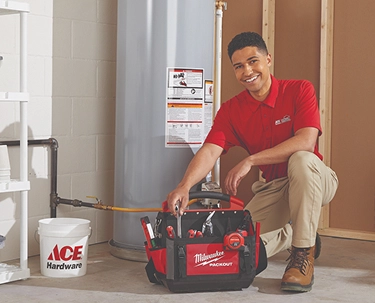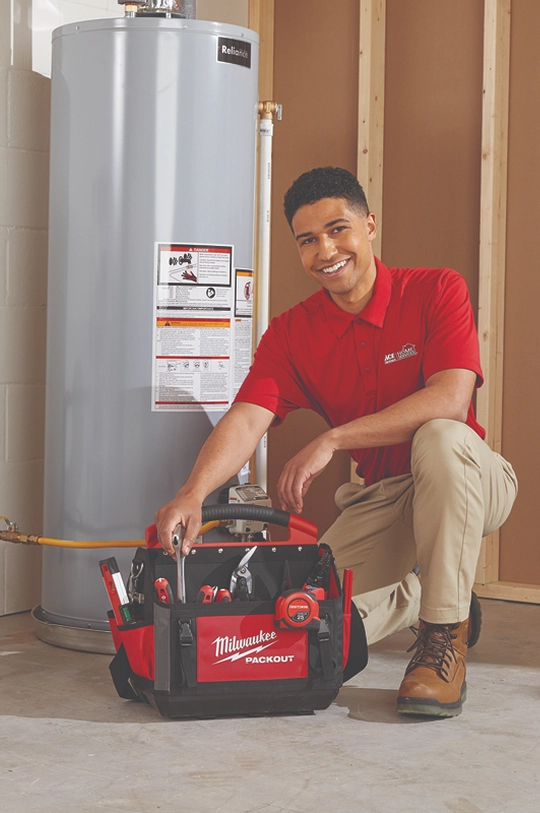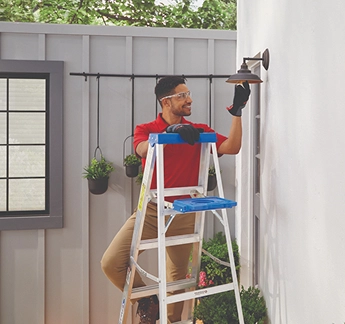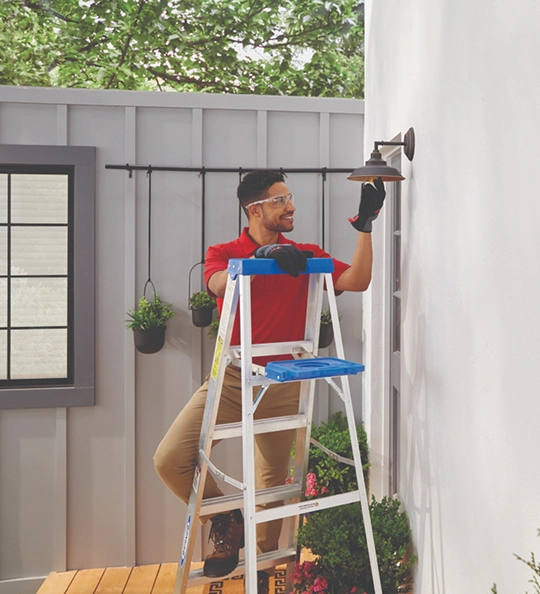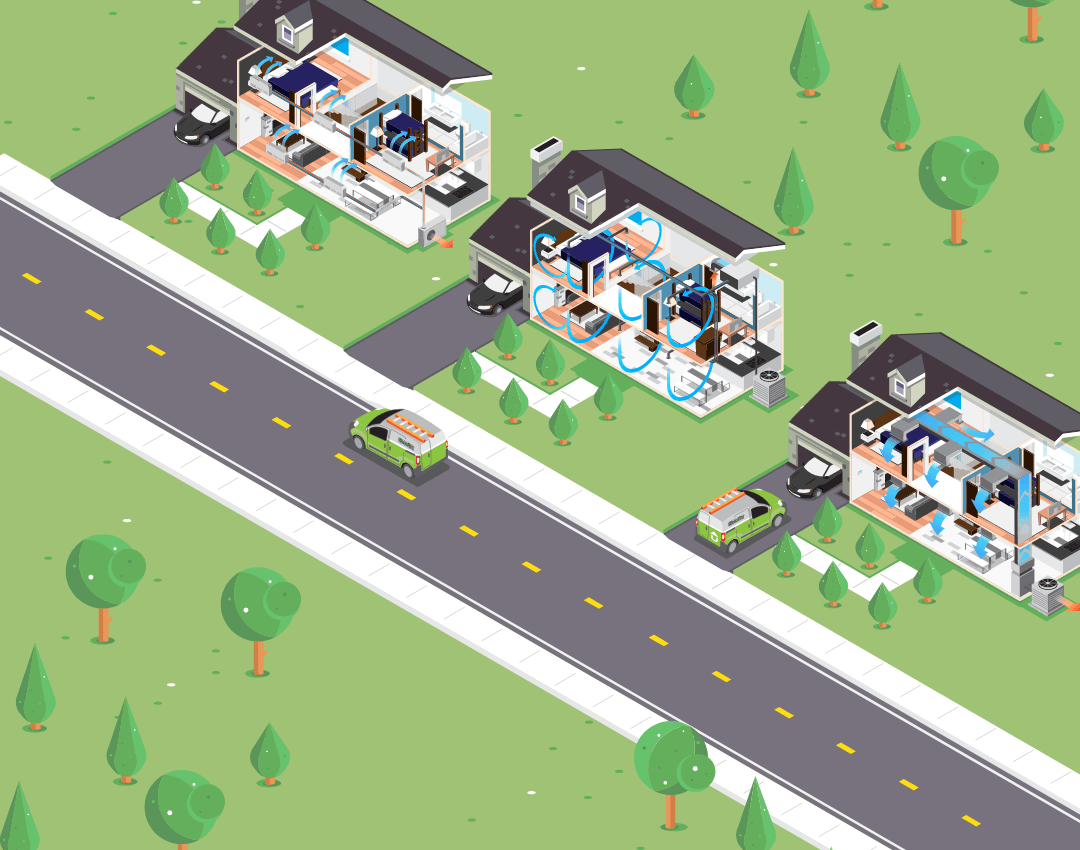
With so many different types of home heating systems, picking the best system for your house is no easy task. Each type of heating system has its own advantages and disadvantages, but how does one decide which solution is best for their home and lifestyle? We’ve put together this breakdown of heating solutions to help you select the best heating source for your home.
Summary of Heating Systems Comparison
Here’s a quick summary of our home heating systems comparison help you pick which one is right for your home.
Furnace Heat System
Due to their efficiency, versatility, and reasonable installation costs, furnaces remain one of the most popular choices in residential heating. However, furnaces require regular maintenance, and depending on the fuel source and distribution system may require additional costs.Quick Facts:
- Average Installation Cost: $4,000-$6,500
- Average Lifespan: 12-15 Years
Boilers
Compared to forced air systems, boiler- based systems commonly use radiators or baseboards to provide heat throughout the home. Simply put, a boiler heats stored water, and that water is circulated throughout the home. However, without proper installation and maintenance, uneven heating can occur through sections of radiators or baseboards.Quick Facts:
- Average Installation Cost: $7,500-$12,500
- Average Lifespan: 15-20 Years
Electric Heat Pumps
An ideal option when natural gas is not available. Most common in condominiums and apartments with lower heating requirements and limited venting options. However, with limited heating capacities and regular maintenance needs, electric heat pumps aren’t the perfect heating system for every home.Quick Facts:
- Average Installation Cost:
- Standard System: $6,000-$12,000
- Ductless System: $4,000-$10,000
- Average Lifespan: 10-12 Years
Geothermal Heat Pumps
Geothermal heat pumps are one of the most efficient home heating systems because they harness the earth’s natural heat instead of creating heat like a traditional system. However, they are the most expensive to install, and can be limited by property constraints.Quick Facts:
- Average Installation Cost: $40,000-$80,000
- Average Lifespan: 30+ Years
Radiant Heat System
Radiant heat systems create an ideal supplement for high traffic areas such as kitchen and baths with limited wall space for radiators or baseboards. However, they are typically connected to a boiler or stand-alone heating tank, leading to an increased upfront installation cost.Quick Facts:
- Average Installation Cost: $12,000-$20,000
- Average Lifespan:
- Hydronic Radiant Heat: 10-45 Years
Electric Baseboard Heat
Electric baseboard heat systems are extremely easy and inexpensive to install and have a relatively long lifespan. However, they are known for being inefficient and having expensive operating costs. Electric baseboard heat systems are ideal secondary heating sources.Quick Facts:
- Average Installation Cost: $400-$1,200
Overview: Factors to Consider When Choosing a Home Heating System
These are the key factors we will review in the home heating systems comparison.
Operating Efficiency
When comparing heating systems for your home, one of the most important factors to consider is the system’s operating efficiency. The higher the efficiency, the more effectively the unit will heat your home without causing your utility bill to skyrocket. Even small differences in operating efficiency can cause large cost differences in the long-run.
Installation Cost
The other most important aspect to consider when looking into a home heating system is the installation cost. In this section, we cover how much each system costs to be installed on average.
Convenience
In the convenience section of each home heating system, we discuss the average lifespan of the system, the required maintenance, which includes how often the unit needs to be serviced, and the accessibility (and cost) of the fuel required to run the system.
Aesthetics
In the aesthetics section of each home heating system, we cover the look and sound of each system. While this section may not be as important as cost and operating efficiency, these are still influential factors to consider. If you are installing the heating system near your bedroom, you probably don’t want a noisy system.
Home Heating Systems Comparison
Furnaces
Due to their efficiency, versatility, and reasonable installation costs, furnaces remain one of the most popular choices in residential heating. They offer great flexibility to fit almost any home, acting as the core of your central heat system.
Furnaces are forced-air systems that heat your home through a heating cycle that works like this:
- The burner is ignited, which heats up a heat exchanger
- The heat exchanger transfers its heat to the incoming air
- The fan forces the heated air into the ductwork and distributes it throughout the house
- As the warm air fills each room, the colder, denser air is drawn back into the furnace through the return ducts and the process is repeated
There are three main types of furnaces: gas, oil and electric.
Gas Furnaces
Gas furnaces are consistent and convenient. The constant source of fuel comes from an underground pipeline so you never have to worry about, or pay for, a fuel delivery, like you would with oil systems. This helps keep operating costs low. Gas furnaces are the most common type of furnace in homes today — however, they can be noisy and can sometimes struggle with heating the entirety of the home.
Oil Furnaces
When it comes to producing heat, oil furnaces are often a little more effective than gas furnaces. However, regular deliveries of oil can become tedious and costly. In addition, oil furnaces are costly to install, and require maintenance and cleaning more often than both gas or electric furnaces.
Electric Furnaces
Generally speaking, electric furnaces are usually inexpensive to purchase up front and are smaller than other furnaces. However, electric furnaces tend to be a lot less efficient, because of the energy costs. Electric furnaces require less regular maintenance and are considered the safest option.
| Gas Furnace | Oil Furnace | Electric Furnace | |
|---|---|---|---|
| Installation Cost (3 Being the Most Costly) |
$ $ | $ $ $ | $ |
| Utility Costs (3 Being The Most Costly) |
$ | $ $ $ | $ $ |
| Operating Efficiency (3 Being The Most Heat Efficient) |
|
|
|
| Convenience (3 Being The Most Convenient) |
+ + | + | + + + |
| Maintenance Required (3 Requires the Most Maintenance) |
|
|
|
Furnace Efficiency
Furnaces are an effective and efficient home heating system. One of the biggest factors to consider is energy efficiency — with high efficiency comes a lower utility bill. Also, depending on the type of furnace you install, you can save even more on future maintenance needs.
AFUE (Annual Fuel Utilization Efficiency) is a measure of how efficiently your furnace can utilize its fuel. AFUE will change drastically depending on the fuel source of the furnace.
It’s important to note that the quality of the installation will affect the efficiency and lifespan of the furnace. A furnace with leaky ducts, improper air volume, or other issues will not function at its maximum efficiency.
Furnace Installation Cost
The price of installing a furnace, whether it’s a gas, oil, or electric furnace, falls right in the middle when compared to other heating systems. The cost of the furnace itself will vary as well based on the various sizes and features available. On average, units start around $6,000 and can go up to around $13,000.
When looking at installation prices for the different types, electric furnaces tend to be the cheapest option, followed by gas furnaces, and lastly, an oil furnace will put the biggest dent in your wallet.
Convenience of a Furnace
With a built-in system that removes moisture from inside, furnaces are designed to self-protect against damaging elements. They’re also built to withstand any chemical build up over time. A properly maintained furnace will last between 15 to 20 years.
However, furnaces do require regular maintenance to ensure efficiency and longevity. We recommend a yearly checkup. This will help promote system efficiency and prevent the need for major repairs down the road.
Furnace Aesthetics
Furnaces are generally considered aesthetically pleasing since they are usually completely hidden from view. Typically, furnaces are placed in the basement, attic, crawl space, or closet within a home and are connected to a ductwork distribution system, making them perfect for residential spaces.
In addition, due to the fact that furnaces are blowing air around the home, using fans and other moving parts to circulate the air, furnaces can lead to a “drafty” feeling if the home lacks insulation.
Schedule an In-Home Consultation
Learn more about furnaces to see if this system is right for your home
Boilers
Boilers are quiet and efficient, making them a great solution for many homeowners.
In simple terms, boiler-based heating systems heat water and distribute either hot water or steam (depending on the type of boiler) throughout your house to increase the temperature.
It gets a little more complicated when you consider the two different types of boilers: steam and hot water.
Steam Boilers
Steam boilers heat the water to a boiling point. That steam generated from the boiling water is then distributed through the heating system, condensing to water in the radiators as it cools.
Hot Water Boilers
Hot water boilers, which are the more popular residential choice, heat the water up to between 140-180° F, and then distribute it through the home. The heated water can be distributed through radiators, baseboard heating units, convectors, or even radiant heat systems embedded in the floor, which makes hot water boilers a great choice for homes with an existing piping system.
Regardless of boiler types, a boiler must use one of three different fuel sources: gas, oil or electricity.
Boiler Efficiency
Water is a much more efficient medium for transferring heat than air, getting hot faster and staying that way for longer. This means that boiler-based systems will heat up more quickly, and maintain heat more efficiently than most forced air systems.
Boiler efficiency, like furnaces, is measured with AFUE (Annual Fuel Utilization Efficiency). When looking at hot water boilers versus steam boilers, steam boilers are considered less efficient because they require more heat in order to get the water to a point where it will boil. Therefore, hot water boilers have a higher AFUE rating. AFUE will change drastically depending on the fuel source of the boiler.
Boiler Installation Cost
New boiler systems tend to cost more to install in a home than many other heating system types, especially if the home does not have an existing piping system to carry the hot water, or steam, around the home. Installing a new boiler generally costs somewhere between $11,000 to $28,000.
Convenience of a Boiler
Instead of having specific locations where hot air is blown into a room, the hot water from the boiler is circulated throughout the home. Therefore, properly designed boiler-based heating systems spread the heat evenly throughout your house, making boilers a great choice for larger, free standing homes and commercial buildings.
Fuel can be a potential issue when it comes to boilers.
- Electricity: Convenient and efficient, but extremely expensive
- Oil: Very effective, but requires regular deliveries of oil, which can become costly
- Gas: Efficient and cost-effective, if your home has access to a natural gas line
- Gas boilers are the most common types of residential boilers in the United States
If you do not have access to a natural gas line, you should consider your electrical bill and/or the cost of oil deliveries when deciding if a boiler is the right heating system for your home.
Looking at the lifespan of a boiler, the average boiler life expectancy is about 10 to 15 years, but that depends on the type of boiler and how well the boiler is maintained.
Boiler Aesthetics
Boilers are generally considered aesthetically pleasing since they are usually tucked away in a utility room or a basement.
Boilers are also a less noisy choice than furnaces since the air isn’t blowing into the home. However, if a boiler is not properly balanced, the radiators or baseboards can “shake.”
Schedule an In-Home Consultation
Learn more about boilers to see if this system is right for your home.
Electric Heat Pumps
An electric heat pump system’s efficiency and versatility make it a great option as both a primary and secondary home heating system. It also allows the system to work for both ducted and ductless homes. So what’s the difference between these two systems?
Standard Heat Pump
The standard heat pump runs using a ventilation system of ducts. It provides slightly superior air circulation because the air is flowing through the ducts. Also, since there is a duct system in place, you won’t need individual air handlers on the walls of rooms. If you don’t like the look of wall units, a standard heat pump system is the way to go.
Ductless Heat Pump
The ductless mini split model uses a room-by-room design. While ducted systems have better circulation, they can also circulate dust and other air pollutants. Ductless heat pumps don’t have this problem, making them a more ideal heating solution for households with asthma and allergy sufferers. Also, because the air handlers in each room can run separately from each other, you can control the temperature from room to room, helping to lower utility costs.
The next question you’ll want to ask is whether or not your home already has ductwork installed.
Both systems consist of a condenser unit that sits outside the home. To provide heat, a condenser unit first extracts the heat from the air outside of your home and transfers it to refrigeration coolant. The coolant is then compressed, which increases the temperature significantly. Then, the coolant is moved either to the indoor units of the heat pump, the air handlers in each room, or throughout the home via the duct system. While in the indoor unit, the air passes over the hot coolant, increasing the temperature to accommodate whatever the thermostat calls for.
A common practice, especially in colder climates, is to combine an electric heat pump with another, non-electric, heating system, such as a boiler. For example, using an electric heat pump with a gas boiler will allow you to only tap into gas heat in the coldest periods of the year.
Electric Heat Pumps Efficiency
Because a heat pump only uses electricity for power rather than for the generation of heat, it offers a remarkably high efficiency rate.
When using a home heating system that uses electricity to generate heat, such as an electric furnace or electric baseboard heat system, the amount of heat generated is proportional to the amount of electricity used, meaning you need to use a lot more electricity to heat the home.
Electric Heat Pumps Installation Cost
The cost of installing an electric heat pump is dependent on which system you choose, standard heat pump or ductless heat pump, and for the ductless system, how many zones you wish to include.
A standard heat pump system can cost anywhere from $6,000 and $14,000 to install. And a ductless system can cost between $11,000 to $26,000 — this range is so large because the number of zones included will greatly affect the cost.
Convenience of Electric Heat Pumps
The life expectancy of a heat pump is about 10 to 15 years. This depends on several factors, including the location of the outdoor unit of the pump, how significantly you change the temperature and how well the heat pump is maintained.
The more drastically you change the temperature of the heat pump, the more strain you put on the system and that can reduce the lifespan. Constant adjusting of the temperature can also cause an increase in your utility bill.
In addition, electric heat pumps do require some maintenance, including:
- Keeping the outdoor unit clear of snow, ice, and debri
- Checking the air filters monthly (cleaning or replacing as needed)
In addition, the heat pump should be inspected about once a year to ensure everything is running properly.
Electric Heat Pumps Aesthetics
Electric heat pump systems are considered aesthetically pleasing, especially the standard system. For ductless systems, the indoor unit is small and generally not considered an eyesore.
Since the system does require an outdoor condenser, the unit will be visible from outside the home. This functionality also works in reverse, allowing heat pumps to provide both heating and cooling for your home. By flipping the flow of the coolant internally, heat pumps can transfer heat from inside your home outside via the outdoor component.
Because the indoor unit does blow air into the home, there is a noise associated with electric heat pumps, but since the condenser sits outside the home, electric heat pump systems are not considered a loud home heating system.
Schedule an In-Home Consultation
Learn more about electric heat pumps to see if this system is right for your home.
Geothermal Heat Pumps
Geothermal heat pumps are one of the most efficient home heating systems. A geothermal system uses small-diameter, High-Density Polyethylene (HDPE) pipes buried underground called a “loop.” The loop circulates water to move heat energy to and from your home.
Unlike other home heating systems, geothermal systems don’t require gas or oil because they harness the natural heat of the earth’s constant underground temperature instead of creating heat, like a traditional heating system. The ground is able to maintain temperature consistency because it absorbs 47% of the sun’s heat as it hits the earth’s surface. Geothermal heat pumps only require minimal electricity in order to function.
Major benefits of geothermal heat pumps:
- Extremely energy and cost efficient
- Provides stable, even temperature throughout the home
- The most environmentally friendly heating system
Even though it’s called a “heat pump”, it can be used for both heating and cooling a home. The heating process is just reversed when you want to cool the home instead of heat it.
There are two different types of geothermal heat pumps: closed loops and open loops.
Closed Loops
Closed-loop geothermal heat pumps circulate an antifreeze solution through a closed loop that is buried in the ground or submerged in water. A heat exchanger transfers heat between the refrigerant in the heat pump and the antifreeze solution in the closed loop.
There are three different types of closed loop circuits:
Horizontal Loops
Horizontal loops are the most common type of geothermal heat pumps and they are generally the most cost-effective option, as long as sufficient land is available.
Vertical Loops
Vertical loops are used when the soil is very shallow. Vertical loops are usually popular choices for large commercial buildings and schools.
Pond/Lake Loops
If there is a lake or pond located near your home, you may be able to install pond/lake loops, which are extremely efficient and cheaper to install.
Open Loops
Open-loop geothermal systems use well or surface body water as the heat exchange fluid that circulates directly through the geothermal heat pump system. Once the water has circulated through the system, it returns to the ground through the well or surface discharge.
Open loop systems can only be used if there is an adequate supply of relatively clean water nearby.
Geothermal Heat Pumps Efficiency
Geothermal heat pumps are arguably the most efficient heating system available. On average, homeowners see a 40-60% reduction in their annual energy/utility bill. In fact, a geothermal system typically pays for itself in less than ten years.
In addition, because the geothermal heat pumps use the earth’s natural heat instead of creating heat, it will not significantly increase your electricity bill.
Geothermal Heat Pumps Installation Cost
Installing geothermal heat pumps can cost anywhere between $20,000 and $80,000. The main factors that impact the cost of the project will be the associated drilling for the “loops” and the amount of work and material needed inside the home. Geothermal heat pumps carry the most significant upfront cost of all systems reviewed in this guide.
Convenience of Geothermal Heat Pumps
The installation price of geothermal heat pumps can be jarring but they will last 50+ years and require little to no maintenance because they live underground, protected from the elements.
Because geothermal systems don’t require gas or oil in order to function, only minimal electricity, you won’t have to worry about having access to natural gas lines or scheduling and paying for regular oil deliveries.
Geothermal Heat Pump Aesthetics
Geothermal heat pump systems require only a single indoor unit (which works with the underground pumps relocating the heat from the home to the ground). This single unit can be easily hidden in a closet, basement, or utility.
In addition, because all the pumps are located underground, geothermal systems are very quiet.
Schedule an In-Home Consultation
Learn more about geothermal systems to see if it is the right system for your home.
Radiant Heat System
A radiant heat system is different from traditional forced air heating systems in that it heats the floors, walls, and/or ceilings rather than the air directly. For allergy sufferers and those worried about indoor air quality, a radiant heat system will not negatively impact indoor air quality.
Radiant heating is, essentially, the practice of heating surfaces in the home and allowing that heat to radiate through the air naturally, instead of heating air and then circulating it through the house using ducts and fans.
There are two main types of radiant heating systems: electric and hydronic (water-based).
Electric Radiant Heat
These systems consist of a series of high resistance coils wrapped in high conductance polymer that are embedded in floors or panels around your home. Electricity passes through the coils, causing them to release heat energy due to the high resistance.
These systems are durable and require very minimal maintenance, but very costly, due to the amount of electricity needed to operate the system.
Electric radiant heat is a great option for heating a specific room.
Hydronic Radiant Heat
Hydronic radiant heat is a water-based system that requires the use of a hot water boiler to heat the water before it is circulated through pipes embedded in the surfaces of your home. *Hydronic radiant heat systems require a boiler.
These systems have a lower operating cost than electric radiant heat, however repairs can be difficult and costly, due to pipes running throughout the home.
In general, this is the most efficient and cost-effective radiant heat system for heating an entire home.
Radiant Heat System Efficiency
Radiant heat systems are one of the more efficient heating systems. They are about 10-30% more efficient than standard HVAC systems, because they retain heat better.
However, the efficiency of radiant heat systems is dependent on which type of system you choose:
- Hydronic radiant heating systems are the most efficient because they are fueled by a boiler, which means you will have lower operating costs.
- Electric radiant heat systems are the second most efficient because although they retain heat well, the electricity needed to operate the system can be costly.
Radiant Heat System Installation Cost
A radiant heating system will tend to have higher upfront installation costs than many alternatives. This is very dependent on the size of the home, the current conditions of the home (if there are circulation vents already in place) and the type of radiant heat system chosen. The average installation cost for a radiant heat system is $5,000 to $8,000 per room.
Convenience of a Radiant Heat System
When it comes to radiant heat systems, retrofitting is the biggest challenge. Heating and cooling components are often integral to the basic infrastructure of the home in which they are installed. That being the case, most do not lend themselves painlessly to retrofit applications. Custom built homes or new home additions may present a great opportunity to consider installing radiant heat.
Once the radiant heating system is installed, it is essentially maintenance-free, especially if it’s an electric system. The boiler required for the hydronic radiant system will require semi-regular maintenance.
In addition, radiant heat systems provide a more uniform feeling of comfort. This is in contrast to central forced air systems, which can create hot spots near heating vents, and cooler spots as the air circulates further and cools down.
The lifespan of radiant heat systems is dependent on the type of system. An electric radiant heat system can last 20+ years. However, a hydronic radiant system will only last as long as the boiler powering it, which is about 10 to 15 years.
Radiant Heat System Aesthetics
Because of the nature of radiant heating systems, they are (almost) completely out of view and operate silently, making them one of the most aesthetically pleasing home heating systems. The only exception here is the boiler that comes along with the hydronic radiant system.
Schedule an In-Home Consultation
Learn more about radiant heat to see if this system is right for your home.
Electric Baseboard Heat
Electric baseboard heat systems are one of the most inexpensive and easy to install home heating solutions; however, that does not mean they are inexpensive in the long run. In fact, electric baseboard heaters are very rarely used as the full time, primary heat source because of the expensive operating cost.
Electric baseboard heaters are individual units that heat a house room-by-room. They require no central heating or expensive ductwork in order to function.
Simply put, electric baseboard heat systems work by drawing in the cool air near the floor, which is then heated over metal fins. The warm air is then gently radiated back into the room and the pattern repeats itself, creating the process known as convection.
Electric Baseboard Heat Efficiency
Electric baseboard heat systems are known for being inefficient and having expensive operating costs. This makes them more ideal as a secondary heating source, heating additional spaces in the home like the basement or a drafty room, or in older homes without ductwork.
Electric Baseboard Heat Installation Cost
Electric baseboard heat systems are extremely easy and inexpensive to install. These units cost significantly less to install than most other types of heating systems. Plus, they do not require modifying your home or installing large pieces of equipment, since they do not require ductwork to operate.
Looking at the entire home, including labor costs, most homeowners pay anywhere from $2,000 to $3,000 per room to install an electric baseboard heat system.
Convenience of Electric Baseboard Heat
Because baseboard heaters do not have to be serviced professionally like forced air systems, they require very little ongoing maintenance.
Electric baseboard heat systems have an average life expectancy of about 20 years. However, the unit could last longer with proper maintenance.
Electric Baseboard Heat Aesthetics
Since electric baseboard heat systems are individual units that are placed directly in each room, they are visible. However, the units are small and placed at the base of the wall, so they aren’t considered eyesores.
It’s important to note that these units should not be directly covered by drapes, a couch or other pieces of furniture. For the heater’s effectiveness and for safety, all objects should be at least 12 inches from the unit.
Since electric baseboard heat does not use forced-air, and have no moving parts like fans, they are almost silent compared to forced air systems.
Schedule an In-Home Consultation
Heating System Installation with Unique Indoor Comfort
Installing a heating unit in your home is easy with Unique Indoor Comfort. Once you schedule your initial consultation, our process starts with the discovery call, to make sure that we understand your needs and problems, and then we recommend our solution. Next, our team will work together with you to create a plan for your home. Then comes delivery and installation, with a quality assurance check to make sure everything is working properly. Lastly, our Unique warranty is a 360 day satisfaction guarantee, if you have any problems or questions, just give us a call, we are available 24 hours a day!
Learn More About Installing a Heating Unit With Unique Indoor Comfort OR
